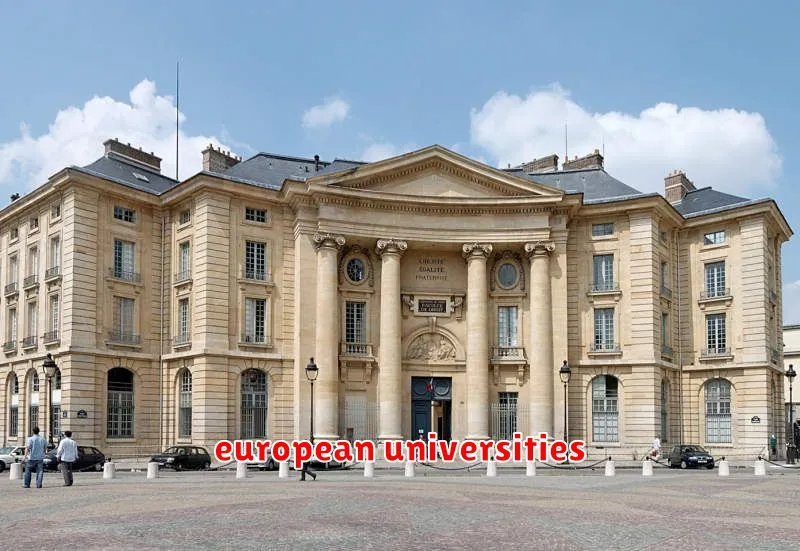Are you dreaming of studying in Europe? With its rich history, diverse cultures, and world-renowned universities, Europe is a top destination for international students. But with so many universities to choose from, how do you know which ones are right for you? This article will highlight the 10 best European universities for international students, considering factors like academic reputation, international student support, and overall student experience. Whether you’re interested in engineering, business, medicine, or the arts, this list has something for everyone. So, pack your bags and get ready to embark on an unforgettable educational journey in Europe!
University of Oxford

The University of Oxford is a collegiate research university in Oxford, England. It is the oldest university in the English-speaking world and the second-oldest in the world (after the University of Bologna). It has been a center of learning for nearly 900 years. The university is consistently ranked among the top universities in the world, and it has educated many notable alumni, including 28 Nobel laureates, 26 British Prime Ministers, and numerous other world leaders.
The university is composed of 39 colleges and six permanent private halls, which are self-governing institutions that provide accommodation, food, and social and academic support for students. The university’s academic departments and faculties are spread across the city, and there are many libraries, museums, and research institutes associated with the university.
The university offers a wide range of undergraduate and postgraduate degrees, including subjects such as the humanities, sciences, social sciences, and medicine. The university is known for its rigorous academic standards and its strong emphasis on research. It is also home to a number of world-renowned research centers, including the Oxford Martin School and the Oxford Internet Institute.
The University of Oxford is a truly unique and special place. Its rich history, beautiful architecture, and world-class academics make it a truly inspiring and transformative experience for students from all over the world.
ETH Zurich

The Swiss Federal Institute of Technology Zurich, also known as ETH Zurich, is a public research university in Zurich, Switzerland. It is consistently ranked among the top universities in the world for science, technology, engineering, and mathematics (STEM).
Founded in 1855, ETH Zurich has a rich history of innovation and discovery. It has produced 21 Nobel laureates, including Albert Einstein, and has been at the forefront of numerous scientific breakthroughs. The university is known for its strong emphasis on research and its commitment to excellence in education. It is a highly selective institution, admitting only the top students from around the world.
Notable Features
ETH Zurich has a number of notable features that make it stand out from other universities:
- World-renowned faculty: The university boasts a faculty of world-leading scientists and researchers.
- Cutting-edge facilities: ETH Zurich has state-of-the-art research facilities and laboratories.
- Strong entrepreneurial culture: The university encourages entrepreneurship and innovation among its students and faculty.
- International focus: ETH Zurich is a highly international university, with students and faculty from all over the world.
Academic Programs
ETH Zurich offers a wide range of academic programs, including:
- Bachelor’s degrees: In over 20 different fields of study, including engineering, science, architecture, and management.
- Master’s degrees: In over 50 different fields of study, including engineering, science, architecture, and management.
- Doctoral degrees: In a wide range of disciplines, with a strong emphasis on research.
ETH Zurich is a highly competitive institution, and its academic programs are rigorous and demanding. However, students who are accepted into the university are given the opportunity to learn from some of the best minds in the world and to conduct cutting-edge research.
Campus Life
The ETH Zurich campus is located in the heart of Zurich, a vibrant and cosmopolitan city. The campus is home to a wide range of student organizations and activities, including sports clubs, music groups, and social clubs. Students have access to a number of on-campus facilities, including libraries, dining halls, and sports facilities.
Zurich is a beautiful and safe city with a high quality of life. It is also a great place to explore Swiss culture and history. Students at ETH Zurich have the opportunity to experience all that Zurich has to offer.
University of Cambridge
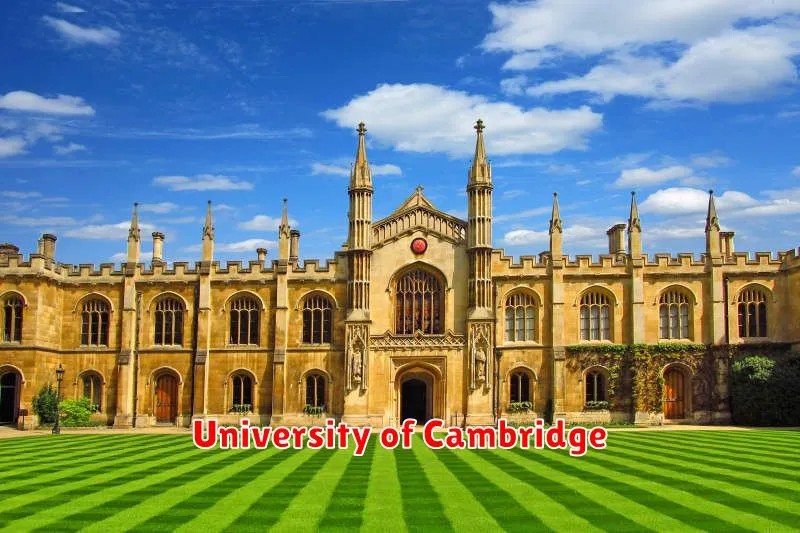
The University of Cambridge is a collegiate public research university in Cambridge, England. Founded in 1209, Cambridge is the second-oldest university in the English-speaking world and the world’s fourth-oldest surviving university. The university grew out of an association of scholars who left the University of Oxford after a dispute with the town’s residents. The university is made up of 31 constituent colleges and over 100 academic departments organised into faculties and schools.
Cambridge is consistently ranked among the top universities in the world. It is known for its academic excellence, world-class research, and beautiful campus. The university has produced many notable alumni, including Stephen Hawking, Isaac Newton, and Charles Darwin.
Academics
Cambridge offers a wide range of undergraduate and postgraduate degrees. The university is particularly renowned for its strong academic departments in the sciences, humanities, and social sciences.
Admissions
Admissions to Cambridge are highly competitive. Applicants must have excellent academic qualifications and strong personal statements. The university also places a great emphasis on extracurricular activities, such as volunteering and leadership.
Campus
The Cambridge campus is spread out across the city. Each college has its own distinctive buildings and grounds. The university also has a number of museums, libraries, and other cultural institutions.
Student Life
Student life at Cambridge is vibrant and diverse. There are numerous student clubs and societies, as well as a wide range of sporting activities. The university also has a strong tradition of debating and theatre.
The University of Cambridge is an exceptional institution of higher learning. It is a place where students can pursue their academic interests, develop their skills, and make lifelong friends.
University of Edinburgh
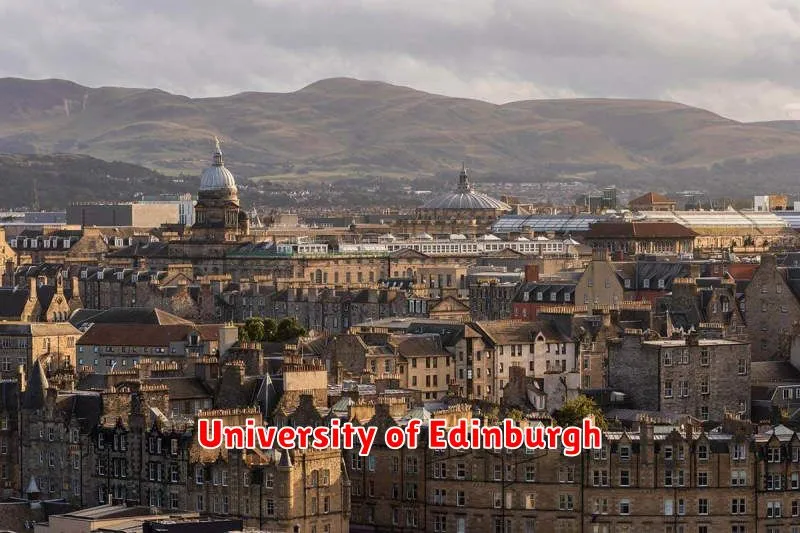
The University of Edinburgh is a public research university located in Edinburgh, Scotland. Founded in 1582, it is Scotland’s oldest university and one of the world’s leading universities. The university has a strong academic reputation and is consistently ranked among the top 20 universities in the world.
The University of Edinburgh has a wide range of academic disciplines, including the arts, humanities, social sciences, science, engineering, and medicine. It is home to a number of world-renowned research centers, including the Edinburgh Cancer Research Centre and the Roslin Institute, which is famous for cloning Dolly the sheep.
The university has a beautiful campus located in the heart of Edinburgh. The campus is made up of a number of historic buildings, including the Old College and the George Square buildings. The university also has a number of modern buildings, including the McEwan Hall and the Edinburgh Centre for Carbon Innovation.
The University of Edinburgh is a very international university, with students from over 150 countries. The university is also a very welcoming and inclusive place, with a strong commitment to diversity and equality.
Academics
The University of Edinburgh is home to a number of world-leading academics, including Nobel laureates and Royal Society Fellows. The university is also known for its strong research output, which is ranked among the top 100 in the world.
The university has a strong focus on interdisciplinary research, with a number of research centers that bring together experts from different disciplines. The university also has a number of partnerships with other universities and research institutions around the world.
Student Life
The University of Edinburgh has a vibrant student life, with a wide range of clubs and societies. The university is also home to a number of sporting teams, including the Edinburgh University Rugby Club and the Edinburgh University Football Club.
The university has a number of student support services, including the Student Counselling Service and the Disability Service. The university also has a number of accommodation options available to students, including halls of residence and private flats.
Location
The University of Edinburgh is located in the heart of Edinburgh, a beautiful and historic city. Edinburgh is a vibrant and cosmopolitan city, with a rich cultural heritage. The city is home to a number of museums, art galleries, theaters, and music venues.
Edinburgh is also a very green city, with a number of parks and gardens. The city is surrounded by stunning countryside, making it a great place to explore.
KU Leuven
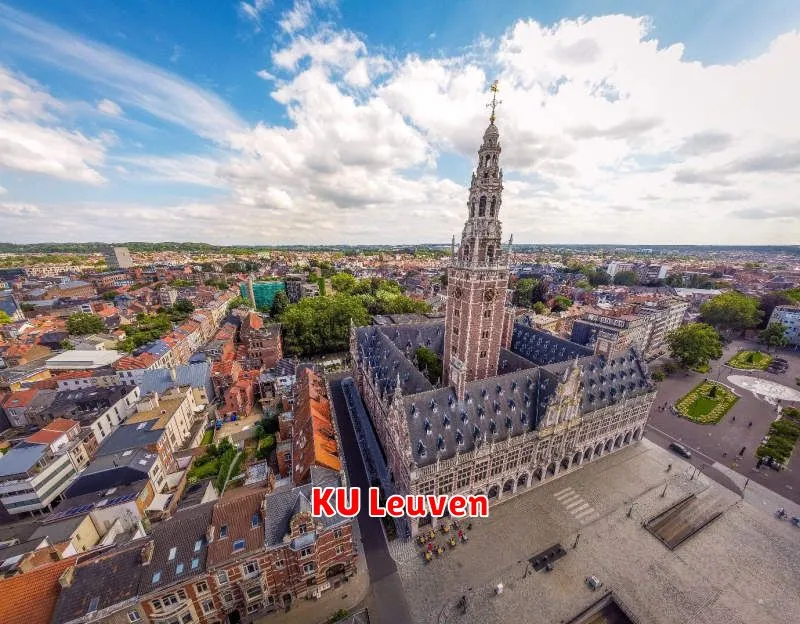
KU Leuven is a leading European university with a rich history dating back to 1425. It is known for its excellent academic reputation, world-class research, and strong international presence.
History and Tradition
Founded as a Catholic university, KU Leuven has a long and distinguished history, playing a significant role in the development of education and culture in Europe. It has produced numerous Nobel laureates and renowned scholars in various fields, including science, medicine, and humanities.
Academic Excellence
KU Leuven is consistently ranked among the top universities globally, boasting a wide range of programs and disciplines. Its faculty comprises leading experts in their fields, providing students with a high-quality educational experience.
Research and Innovation
KU Leuven is a hub for research and innovation, with a strong focus on scientific breakthroughs and societal impact. It collaborates with leading institutions worldwide, contributing to advancements in areas such as medicine, technology, and sustainability.
International Outlook
KU Leuven embraces diversity and international collaboration. It attracts students and faculty from around the world, creating a vibrant and multicultural campus environment. The university offers numerous international exchange programs and joint research initiatives.
Campus Life
The KU Leuven campus is located in the historic city of Leuven, Belgium. Students enjoy access to a wide array of facilities, including libraries, research centers, sports facilities, and student organizations. The city itself offers a rich cultural experience with numerous museums, theaters, and events.
KU Leuven is a prestigious university that combines tradition with innovation, offering a world-class education and research experience. Its commitment to academic excellence, research, and international collaboration makes it a top destination for students and researchers seeking to make a meaningful contribution to society.
University of Copenhagen

The University of Copenhagen, founded in 1479, is the oldest and largest university in Denmark. Located in the heart of Copenhagen, it is a renowned institution of higher education and research, consistently ranking among the top universities in the world.
History and Legacy
With a rich history spanning over five centuries, the University of Copenhagen has played a pivotal role in shaping Denmark’s intellectual and cultural landscape. From its humble beginnings as a small institution dedicated to theology and law, it has evolved into a comprehensive university encompassing a wide range of academic disciplines.
Academic Excellence
The University of Copenhagen is renowned for its academic excellence, boasting a distinguished faculty, world-class research facilities, and a diverse student body. It offers a wide array of undergraduate and postgraduate programs, covering fields such as science, technology, humanities, social sciences, and health sciences.
Research and Innovation
Research is at the heart of the University of Copenhagen’s mission. Its researchers are actively engaged in groundbreaking work across various disciplines, contributing to scientific advancements, technological innovation, and societal progress.
Campus Life
The university’s vibrant campus offers a stimulating and supportive environment for students. With its historic buildings, modern facilities, and diverse student community, it provides an enriching experience both inside and outside the classroom. Students have access to a wide range of resources, including libraries, research centers, student organizations, and cultural events.
Global Engagement
The University of Copenhagen is committed to fostering international collaboration and exchange. It has strong partnerships with universities and research institutions around the world, providing opportunities for students and faculty to engage in global research and learning.
University College London

University College London (UCL) is a public research university located in London, England. It is one of the oldest and most prestigious universities in the world, and is consistently ranked among the top universities globally. UCL was founded in 1826 as the first secular university in England, and has a long and distinguished history of academic excellence and innovation.
Academics
UCL is home to a wide range of academic disciplines, with over 100 departments and institutes across its 11 faculties. These faculties are:
- Faculty of Arts & Humanities
- Faculty of Laws
- Faculty of Engineering Sciences
- Faculty of Mathematical & Physical Sciences
- Faculty of Life Sciences
- Faculty of Population Health Sciences
- Faculty of Social & Historical Sciences
- Faculty of Built Environment
- Faculty of Education & Society
- Faculty of Medical Sciences
- Faculty of Brain Sciences
UCL is renowned for its research, and is one of the leading research universities in the world. The university is home to numerous world-leading research centers and institutes, including the:
- UCL Institute of Education
- UCL Cancer Institute
- UCL Institute for Global Health
- UCL Energy Institute
- UCL Institute for the Study of the Americas
Campus
UCL’s main campus is located in Bloomsbury, a central London district known for its cultural and academic institutions. The campus is a mix of historic and modern buildings, and is home to a variety of facilities, including libraries, museums, theaters, and sports grounds.
Student Life
UCL has a large and diverse student body, with over 42,000 students from over 150 countries. The university offers a wide range of student activities and support services, including:
- Student unions
- Societies and clubs
- Sports facilities
- Careers services
- Counseling and support services
UCL is a vibrant and exciting place to study, and offers its students a unique and enriching educational experience.
Ludwig Maximilian University of Munich
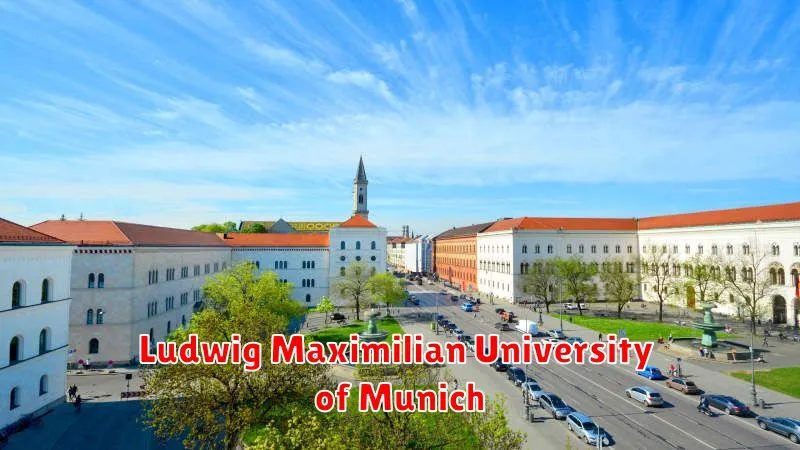
The Ludwig Maximilian University of Munich (LMU) is a public research university located in Munich, Germany. Founded in 1472, it is one of the oldest and most prestigious universities in Germany and Europe. LMU is a comprehensive university with a wide range of academic disciplines, including humanities, social sciences, natural sciences, medicine, and law.
LMU is renowned for its excellence in research and teaching. It is home to numerous Nobel laureates, including Werner Heisenberg, Max Planck, and Thomas Mann. The university also has a strong reputation for its international collaborations and its commitment to interdisciplinary research.
Academics
LMU is organized into 18 faculties, covering a broad spectrum of academic fields. The university offers a wide range of undergraduate and graduate programs, as well as doctoral degrees. Some of the most popular academic programs at LMU include:
- Medicine
- Law
- Business Administration
- Computer Science
- Psychology
- History
- Philosophy
Campus Life
LMU’s main campus is located in the heart of Munich, close to the city’s major attractions. The campus is home to a vibrant student community with a wide range of student organizations, clubs, and activities. There are also several student residences on campus, providing affordable housing options for students.
Research
LMU is a leading research university with a strong focus on interdisciplinary research. The university is home to numerous research centers and institutes, including:
- The Max Planck Institute for Physics
- The Helmholtz Zentrum München
- The Bavarian Academy of Sciences and Humanities
International Reputation
LMU is consistently ranked among the top universities in the world. It is recognized for its excellence in research, teaching, and innovation. The university has a strong international reputation and attracts students and scholars from all over the world.
Sorbonne University
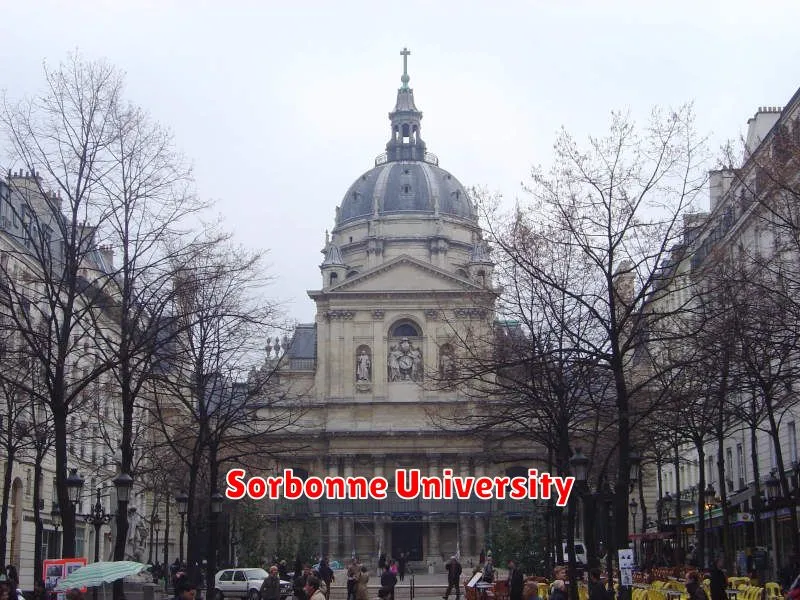
The Sorbonne University is a prestigious public research university located in Paris, France. It is one of the oldest and most renowned universities in the world, with a rich history spanning over 800 years.
Founded in 1257 by Robert de Sorbon, the university initially focused on theology and philosophy. Over the centuries, it expanded its academic offerings to include a wide range of subjects, including law, medicine, science, and the arts.
The Sorbonne’s reputation for academic excellence has attracted students and scholars from around the globe. It is home to numerous Nobel laureates, prominent researchers, and influential thinkers. Its alumni include famous figures such as Marie Curie, Simone de Beauvoir, and Jean-Paul Sartre.
The university consists of 13 faculties, each specializing in different fields of study. These faculties offer a diverse range of undergraduate and postgraduate programs, as well as doctoral research opportunities. The Sorbonne also houses several world-class research centers and institutes, dedicated to advancing knowledge in various disciplines.
The Sorbonne University is known for its rigorous academic standards, its commitment to research, and its vibrant intellectual atmosphere. It is a place where students and faculty can engage in critical thinking, explore new ideas, and contribute to the advancement of knowledge.
Today, the Sorbonne University continues to play a significant role in the intellectual and cultural landscape of France and beyond. It remains a symbol of academic excellence, innovation, and the pursuit of knowledge.
Sciences Po
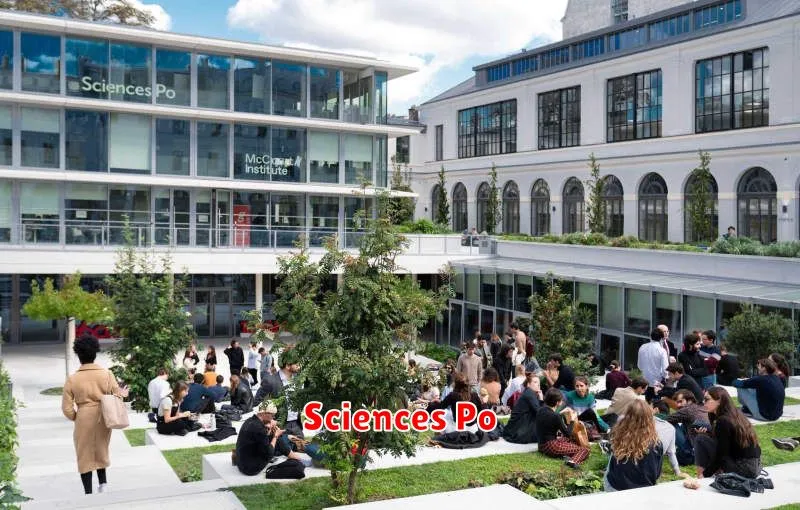
Sciences Po, officially known as the Institut d’études politiques de Paris (French for “Institute of Political Studies of Paris”), is a prestigious French graduate school specializing in the social sciences, particularly politics, economics, and law.
Founded in 1872, Sciences Po has a long and distinguished history of educating leaders in government, business, and civil society. It is widely considered one of the top universities in the world for social sciences and has a strong reputation for academic excellence and research.
The university offers a range of undergraduate and graduate programs, including a highly competitive Bachelor of Arts in Political Science and a Master of Public Affairs. Sciences Po also has a strong focus on international affairs and offers a wide range of programs and research centers devoted to global issues.
Campus and Locations
Sciences Po has campuses in Paris, Le Havre, Menton, and Reims, each offering a unique learning experience. The main campus in Paris is located in the heart of the city, near the Seine River and the Louvre Museum. The university also has a vibrant student community, with over 14,000 students from over 150 countries.
Notable Alumni
Sciences Po boasts a distinguished list of alumni, including numerous heads of state, government officials, business leaders, and journalists. Some notable alumni include:
- François Hollande, former President of France
- Emmanuel Macron, current President of France
- Christine Lagarde, President of the European Central Bank
- Jacques Attali, French economist and writer
Admissions
Admissions to Sciences Po are highly competitive, with a rigorous selection process. Applicants are required to submit strong academic transcripts, letters of recommendation, and a personal statement. The university also conducts interviews as part of the admissions process.
Tuition and Fees
Tuition fees for Sciences Po vary depending on the program and the student’s nationality. However, the university offers a range of scholarships and financial aid options to support students from diverse backgrounds.
Overall, Sciences Po is a prestigious and internationally recognized university that offers a world-class education in the social sciences. With its strong academic reputation, diverse student body, and renowned alumni, Sciences Po continues to be a top choice for students seeking a challenging and rewarding educational experience.

